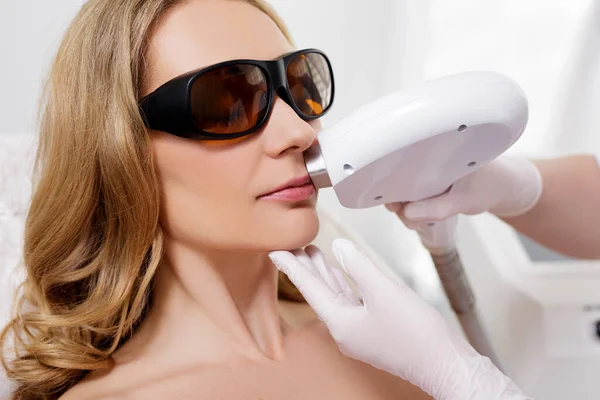Can Laser Hair Removal Cause Skin Discoloration?

Laser hair removal has become a popular method for achieving long-term hair reduction, offering a convenient and efficient alternative to traditional hair removal techniques. However, some individuals may experience skin discoloration as a side effect of the treatment. Understanding the potential causes, risk factors, and preventive measures can help you make informed decisions before undergoing Laser Hair Removal Dubai.
Understanding Laser Hair Removal:
Laser hair removal works by targeting the pigment (melanin) in hair follicles with concentrated beams of light. This light energy is absorbed by the melanin, which damages the hair follicle and inhibits future hair growth. The procedure is designed to be quick and effective, with minimal discomfort, making it an attractive option for many people seeking a smooth, hair-free appearance.
What is Skin Discoloration?
Skin discoloration refers to a change in the color of the skin. It can manifest as dark spots, light spots, or an overall uneven tone. Skin discoloration occurs when there is an excess or loss of melanin, the pigment responsible for the skin's color. These changes can be temporary or permanent, depending on the severity and cause.
Can Laser Hair Removal Cause Skin Discoloration?
Laser hair removal can cause skin discoloration in some individuals, although this is not a common side effect. The treatment uses intense light energy, which may trigger changes in the skin's pigmentation, especially in people with darker skin tones or those who are more prone to hyperpigmentation or hypopigmentation.
Factors That May Contribute to Skin Discoloration:
Several factors can increase the risk of skin discoloration after laser hair removal. These include:
Skin Tone and Type:
Individuals with darker skin tones tend to have a higher amount of melanin in their skin. Since laser hair removal works by targeting melanin in hair follicles, the laser may also affect the surrounding skin. This can lead to either hyperpigmentation (dark spots) or hypopigmentation (light spots) in the treated area.
Laser Settings:
The settings used during the laser hair removal treatment, including the wavelength and intensity, can influence the likelihood of skin discoloration. Higher-intensity lasers may increase the risk of pigmentation changes, especially in individuals with sensitive or darker skin.
Sun Exposure:
Excessive sun exposure before or after laser hair removal increases the risk of pigmentation changes. Sunburn or tanning can make the skin more sensitive to the laser treatment, causing unwanted discoloration. It's essential to avoid sun exposure before and after the treatment to protect your skin from complications.
Skin Sensitivity:
Individuals with highly sensitive skin may experience an increased risk of discoloration. Sensitive skin reacts more readily to various stimuli, including laser energy, making it more susceptible to changes in pigmentation. People with conditions like rosacea or eczema may also experience heightened sensitivity during the treatment, leading to skin discoloration.
Improper Treatment Technique:
If the laser is not applied properly, it may cause excessive damage to the skin, leading to pigmentation changes. For example, if the laser is used too aggressively or for too long on a particular area, it could result in either dark spots or lighter patches on the skin. This emphasizes the importance of seeking treatment from experienced professionals who understand the intricacies of laser technology.
Preventing Skin Discoloration During Laser Hair Removal:
While skin discoloration is a possible side effect, there are several steps you can take to minimize the risk:
Pre-Treatment Consultation:
Before undergoing laser hair removal, it's crucial to consult with a professional who can assess your skin type and determine whether you're a good candidate for the treatment. The professional will customize the treatment plan based on your skin's needs, helping to minimize the risk of side effects like discoloration.
Choosing the Right Laser Technology:
There are various types of lasers used for hair removal, each designed for different skin types. Some lasers are better suited for individuals with lighter skin, while others are more effective for people with darker skin tones. Ensure that the professional performing the procedure uses the appropriate laser technology for your skin type to minimize the risk of pigmentation changes.
Avoid Sun Exposure:
Protecting your skin from the sun is essential both before and after the treatment. Avoid tanning or prolonged sun exposure to reduce the risk of discoloration. Applying sunscreen with a high SPF can help shield the skin from UV rays, which can trigger pigmentation changes in the treated area.
Follow Pre-Treatment Instructions:
Proper preparation for laser hair removal is key to achieving the best results and minimizing side effects. This may include avoiding certain skin care products, exfoliating the skin, or temporarily discontinuing the use of hair removal methods like waxing or tweezing.
Post-Treatment Care:
Following the laser hair removal procedure, it's important to follow any aftercare guidelines provided by the professional. This may include avoiding hot showers, strenuous exercise, or the use of harsh skincare products that could irritate the skin. Proper aftercare can help ensure that your skin heals without experiencing excessive discoloration.
How to Treat Skin Discoloration After Laser Hair Removal:
If you experience skin discoloration after Laser Hair Removal in Dubai, there are several ways to address the issue:
Patience:
In many cases, skin discoloration is temporary and will gradually fade over time. It may take several weeks or months for the skin to return to its normal color, depending on the severity of the pigmentation changes. During this time, it's important to continue protecting the skin from the sun and avoiding irritants.
Consult a Professional:
If the discoloration persists or is particularly bothersome, it's a good idea to consult with a professional who can recommend appropriate treatments. In some cases, additional treatments like chemical peels or lightening creams may be suggested to help even out the skin tone.
Conclusion:
While laser hair removal can cause skin discoloration in some individuals, the risk is generally low when the procedure is performed correctly and appropriate precautions are taken. By understanding the factors that contribute to skin discoloration and following the necessary steps before and after treatment, you can reduce the chances of experiencing pigmentation changes. Always seek professional guidance to ensure the best possible outcome from your laser hair removal treatment.
Note: IndiBlogHub features both user-submitted and editorial content. We do not verify third-party contributions. Read our Disclaimer and Privacy Policyfor details.











